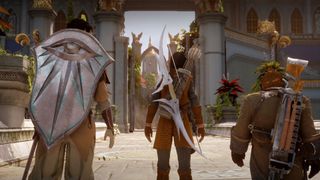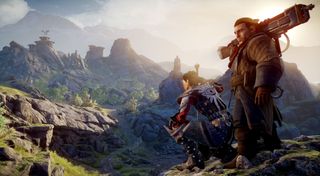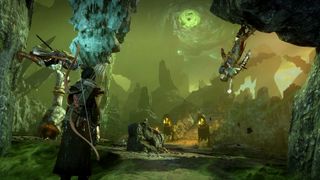The making of Dragon Age: Inquisition
How Bioware build RPGs.

"The two things that came out of it was a desire to have characters who were straight, who were bi, who were gay," Laidlaw continues. "We wanted to make sure that the romances were different, were fresh, didn't just amount to 'I love you, I love you too, and now kiss.' The other big thing for me was making it so that they didn't follow a script that was quite as predictable as we have done in the past. That better matches how life works."
Over time, BioWare RPGs have steadily moved away from 'simulation' in the way that it is generally considered to operate in games, but their increased willingness to present complex social situations to the player demonstrates a way of achieving a level of detail that a systems-driven game never could. This commitment to a particular kind of believability exists in tension with not only player expectations (as in the case of the guy who takes to the forums to demand to romance everybody) but also the game's budget. It costs time and money to render many different possible interactions at this level of detail, and the willingness to invest those resources is something specific, at the moment, to BioWare and its RPGs.
Inquisition is notable for having fewer, more significant cameos than its predecessor.
Whenever a longstanding, fan-favourite character returns in a future game, this represents a willingness on the part of the studio to invest heavily into making that happen. Often, a player’s delight at one cameo will lead them to expect more—and, ultimately, to be disappointed when they don’t get to see every familiar face in a new game. Inquisition is notable for having fewer, more significant cameos than its predecessor. The role of Varric, Morrigan, Leliana, Hawke, Alistair, and Loghain is significant, but many other characters sit this one out. This isn't down to a lack of time or an unwillingness to please fans: in many cases, it's a matter of putting the story ahead of fan service.
"We think about this a lot," Laidlaw says. "Who would come back? Well, who would care. Who would add something, emotionally, to the texture of the game. If it's a character who shows up simply to show up, it falls flat."

"If we did bring back everybody it’d be like a parade," Gaider says. "We've got two games in the past, one expansion and some DLC. We can't have them just come marching back. We’ve done some of that , and I don’t think it works particularly well so we just pick our battles."
Recurring characters also represent different levels of risk based on how complicated their backdrops have become. Someone like Varric is an example of a low-risk inclusion. "He is a very popular character and he had places to go," says Chee. Varric had a stake in the stories of both Dragon Age 2 and Inquisition and, crucially, is guaranteed to have survived Dragon Age 2. Other examples aren't as simple. I ask the group if there are any choices regarding companions that they’ve regretted presenting to the player.
"Daaaaave?" says Chee. "Er, yes," Gaider replies. "Sometimes I want to write a letter to past-Dave and say 'future-Dave does not appreciate your decisions.'"
The biggest gaming news, reviews and hardware deals
Keep up to date with the most important stories and the best deals, as picked by the PC Gamer team.
He continues. "It’s not necessarily regret, but there are definitely 'aw, if only' situations where a character who turned out to be super cool could die. That creates a 'Schrödinger's character', and as such they become much more risky to include in future titles."
"We keep half-killing Alistair, for example." Gaider says. "At this point he’s only 10% alive."

When a character enters this state, the team refers to it as becoming "quantum". Sometimes, being quantum means not coming back, or coming back in a limited capacity. Other times, more rarely, the team will make a decision to alter that fact entirely—as in the case of Leliana, who can "die" in Origins but returns in a major role in Inquisition regardless.
"I'll own it—that was my call," Laidlaw says. "I thought that Leliana had a lot to add to the games and I decided that we were going to bring her back. The writing team has been very graceful in humouring me throughout that."
"Poor Sheryl's nightmare was to write those parts of Leliana where there were many different choices from previous games," says Gaider.
Chee ticks off the options. "She could have died, you could have romanced her, you could have romanced her and then you died, you could have never recruited here, you could have 'hardened' her."
"Leliana interacting with Morrigan is two quantum states coming together," Gaider says. "We created antimatter."
Nonetheless, there are moments when the team embraces the complexity they've created for themselves in order to get access to the dramatic potential it possesses. A good example of this is the mission 'Here Lies The Abyss', which concludes with the dramatic decision to sacrifice either Hawke or one of three different Grey Wardens from prior games—all characters that can exist in multiple states. I noted the complexity of that moment to Mike Laidlaw.
Joining in 2011, Chris made his start with PC Gamer turning beautiful trees into magazines, first as a writer and later as deputy editor. Once PCG's reluctant MMO champion , his discovery of Dota 2 in 2012 led him to much darker, stranger places. In 2015, Chris became the editor of PC Gamer Pro, overseeing our online coverage of competitive gaming and esports. He left in 2017, and can be now found making games and recording the Crate & Crowbar podcast.
Most Popular


